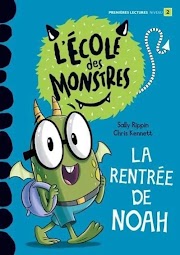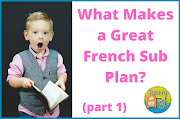Notice & Note Book Club - Section 1
Welcome to the first part of our online Notice & Note Book Club!
I was really anxious to share some reflections with teacher colleagues in this manner this summer. Sadly I couldn't round up enough French teacher bloggers who might like to share ideas about specific reading material (I know you're out there! Please contact me if you're up for something like this in the future!) However, language teachers ARE literacy teachers, and I'm excited to be involved with this initiative led by Melissa at Dilly Dabbles.
I want to share a few thoughts that struck me in the first part of this resource.
The authors shared that they wrote the book because they saw "too many readers who finish and ... seem not to have noticed anything, responded to anything, been touched or troubled or amused by anything." This resonated with me, as I taught a novel study in class last year and had students tell me "I understand the words, but it doesn't MEAN anything to me." I really wasn't sure how to respond at the time. How could this be, I wondered. My students were not low, academically, but they didn't really seem to be able to make meaning for themselves when reading in their second language. I was working hard to try to encourage students to use various reading strategies, but in the end, it just didn't seem to be enough.
The authors shared that they wrote the book because they saw "too many readers who finish and ... seem not to have noticed anything, responded to anything, been touched or troubled or amused by anything." This resonated with me, as I taught a novel study in class last year and had students tell me "I understand the words, but it doesn't MEAN anything to me." I really wasn't sure how to respond at the time. How could this be, I wondered. My students were not low, academically, but they didn't really seem to be able to make meaning for themselves when reading in their second language. I was working hard to try to encourage students to use various reading strategies, but in the end, it just didn't seem to be enough.
In the introduction, Beers and Probst talk about "the signposts" and I see on the inside cover flap a handy guide related to them, but what I'm still wondering at this point is whether this is a well known term that's just new to me, or if it's strictly related to close reading... or to this resource in particular. I'm sure that will become clearer as I progress through the book.
Is Reading Still Reading?
I think that it CAN be, but isn't always. Skimming isn't reading. Scanning isn't reading. Surfing isn't reading and scrolling through a Twitter feed or blog roll isn't reading... but they can lead to reading.
What's the Role of Fiction?
I think we as teachers "get" the recent push for students to understand nonfiction texts in various forms, and yet I still feel fiction is more likely to touch students' hearts and to get them excited. So I was pleased to read the quote from Beers that "nonfiction lets us learn more; fiction lets us BE more". Being exposed to great literature makes us better able to interact with others in our own lives, the book asserts.
I was also pleased to feel like I was given permission by Notice & Note to actually teach a novel... even though the educational trend here in Ontario (Canada) seems to be moving far away from that, in favour of Book Talks, Clubs, lit circles and the like.
How do you prefer to use novels in your classroom? I'm especially dying to hear from other FI teachers. Be sure to take a look at what my edublog friends had to say about this first section too. And remember, it's not too late to join us by commenting on any blog post that appeals to you!









